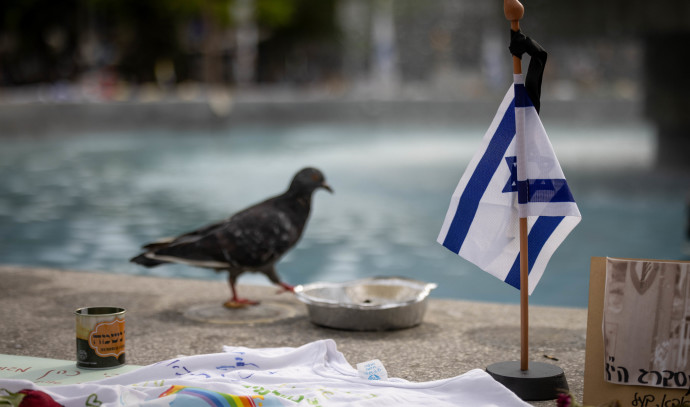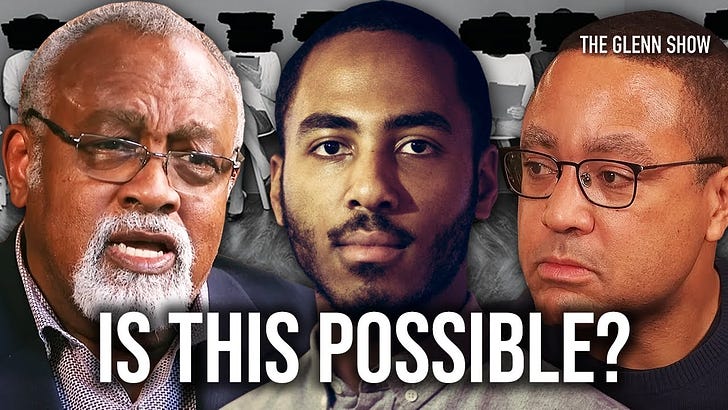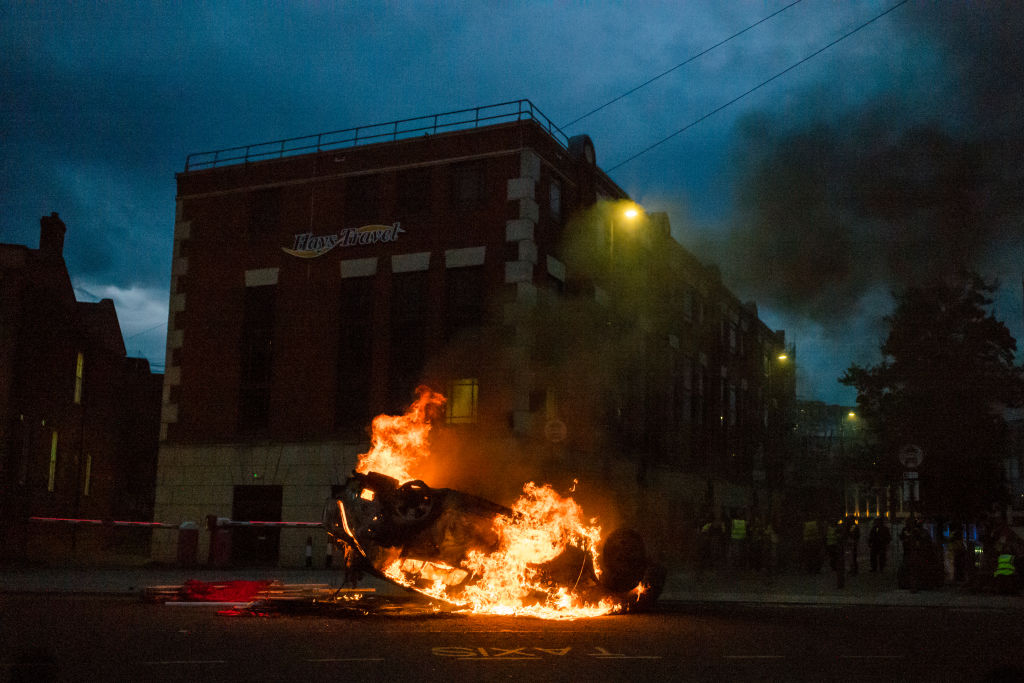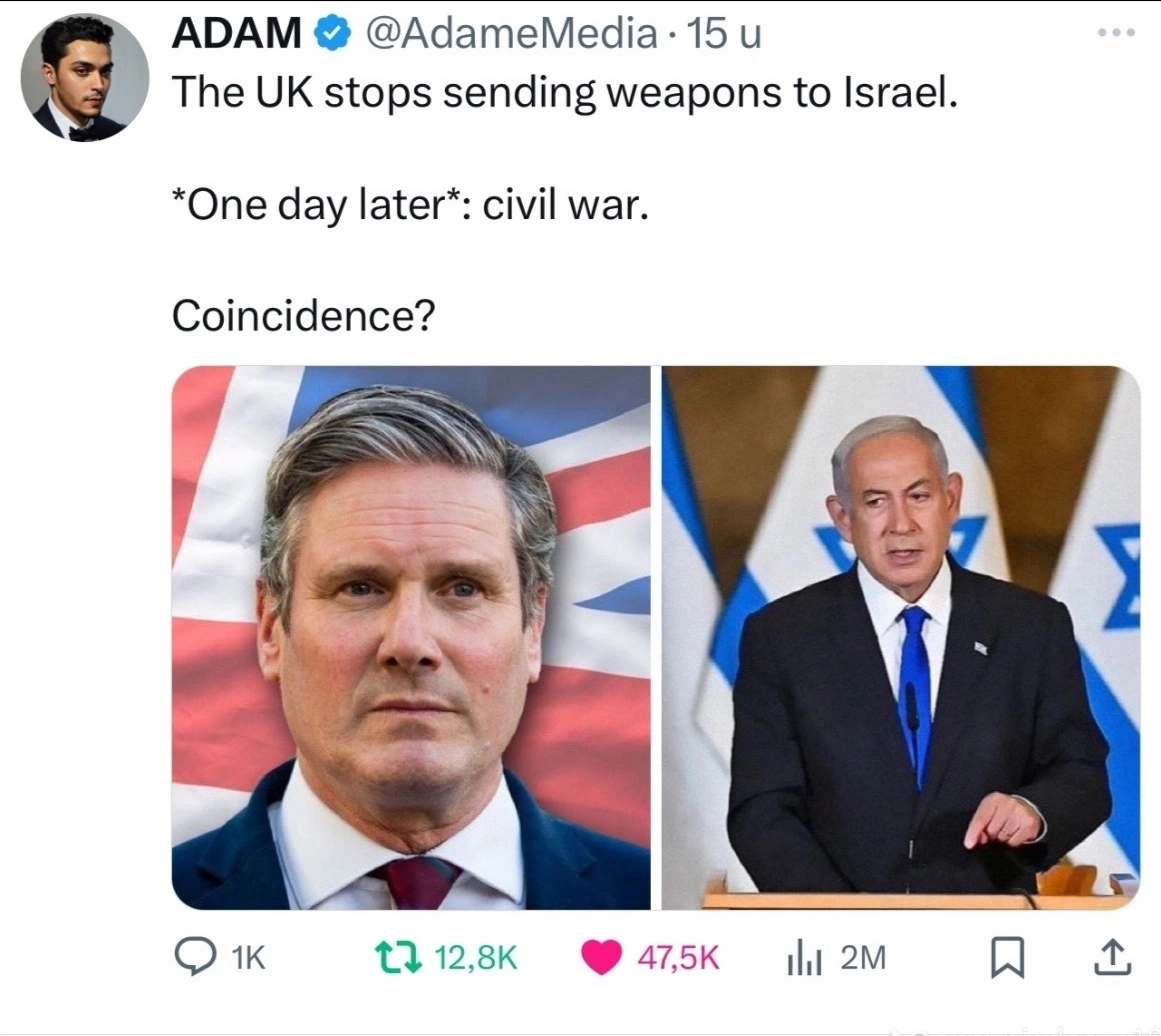#racism

Jewish Council of Australia opposes antisemitism bill.
"The Jewish Council calls on the Senate Committee to reject this divisive Bill and instead recommends the Government focus on developing comprehensive, intersectional approaches to combat antisemitism and all forms of racism and discrimination in Australian society."
#Israel
#Palestine
#censorship
#hasbara
#propaganda
#antisemitism
#racism
#FreedomOfSpeech
#Australia
https://www.jewishcouncil.com.au/media/jewish-council-of-australia-opposes-coalitions-antisemitism-bill-citing-political-agenda-to-stifle-free-speech-on-palestine
One person like that
2 Shares
About the American Slave Trade
August 20, 2024 marks the 405th anniversary of slavery in the United States
August 20, 1619 - A ship brought the first 20 African Negroes to America, who were sold into slavery to the inhabitants of Jamestown.
The English privateer ship reached Point Comfort on the Virginia Peninsula. There, Governor George Yardley and his head of commerce, Cape Merchant Abraham Piercy, bought the “20-odd negroes” aboard in exchange for “provisions” - meaning they were trading food for slaves.
The year 1619 was a milestone in the long history of slavery in the European colonies and the beginning stages of what would become the institution of slavery in America.
The human cargo that arrived in Virginia in 1619 came from the port city of Luanda, now the capital of modern Angola. It was then a Portuguese colony, and most of the slaves are believed to have been captured during the ongoing war between Portugal and the Ndongo kingdom, as John Thornton wrote in The William and Mary Quarterly in 1998. Between 1618 and 1620, some 50,000 slaves - many of them prisoners of war - were exported from Angola. An estimated 350 of these captives were loaded onto a Portuguese slave ship called the São João Bautista (better known as the San Juan Batista ).
The ship was on its way to the Spanish colony of Veracruz when two English privateers, the White Lion and the Treasurer, intercepted it and captured some of the Angolans on board. According to James Horne, president and chief officer of the Jamestown Rediscovery , both vessels belonged to a powerful English nobleman, Robert Rich, Earl of Warwick. Rich was anti-Hispanic and anti-Catholic and profited from the disruption of Spanish shipping in the Caribbean. The White Lion, which flew the flag of a Dutch port known for its pirates, was the first to arrive in Virginia in late August 1619, followed four days later by the Treasurer.

These 20 captives are believed to have been the first African slaves to arrive in what would become the United States 150 years later.
Four hundred years later, the arrival of the captives influenced virtually every important moment in American history, even if that history was created around anyone but Africans and African Americans. After all, for many Americans, familiarity with U.S. history is tied to the arrival of 102 passengers on the Mayflower in 1620. A year earlier, however, 20 African slaves had been brought to the British colonies against their will.
“Historians, elected politicians [and] community leaders would prefer to represent the United States as some mythical, Anglo-Saxon Christian place,” said Michael Guasco, a professor of early American history at Davidson College.
In 1992, Toni Morrison told the Guardian, “In this country, American means white. Everyone else has to spell it with a hyphen.”
After 1619, most of the country remained white and relied heavily on the labor of Indian slaves and white European indentured servants. It wasn't until the late 17th century that the transatlantic slave trade made its impact on the American colonies. There are now 26.5 million descendants of Africans in the United States.
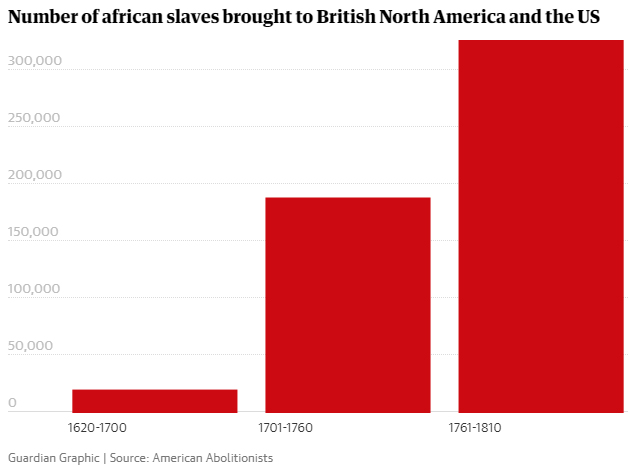
1661
The first anti-racial law - prohibiting marriage between the races - was passed in Maryland in 1661, shortly after slaves were brought to the colonies. By the 1960s, these laws were still in effect in 21 states, most of them in the South . Alabama was the last state to repeal its ban on interracial marriage in 2000.
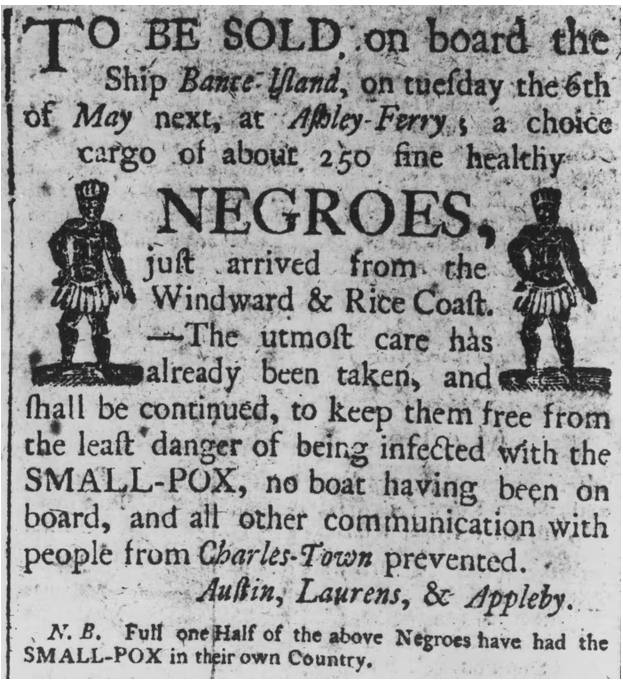
Advertisement in Boston for a cargo of about 250 “fine healthy negroes” recently arrived from Africa on the slave ship Bunte Island. About 1700.
1776
The Declaration of Independence, which in its first lines stated that “all men are created equal and endowed by their creator with certain unalienable rights,” did not extend that right to slaves, Africans, or African Americans, and the reference to condemn slavery was deleted in the final version. Thomas Jefferson, himself a slaveholder, wrote these lines rejecting slavery; he deleted the reference after receiving criticism from a number of delegates who had enslaved blacks. This may represent “the fabric of the American political economy” since then, as some historians say.
Initially, slavery flourished on tobacco plantations in Virginia, Maryland and North Carolina. In the tobacco areas of these states, slaves made up more than 50 percent of the population by 1776. Slavery then spread to rice plantations farther south. In South Carolina, African Americans remained the majority until the 20th century, according to census data.
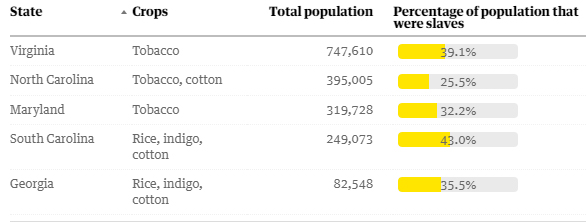
1860
The slave trade across the Atlantic, organized by the British, was one of the largest businesses of the 18th century. Approximately 600,000 of the 10 million African slaves made their way to the American colonies before the slave trade - not slavery - was banned by Congress in 1808. By 1860, however, there were nearly 4 million enslaved black people - 13% of the population - in the United States as the American-born population grew.
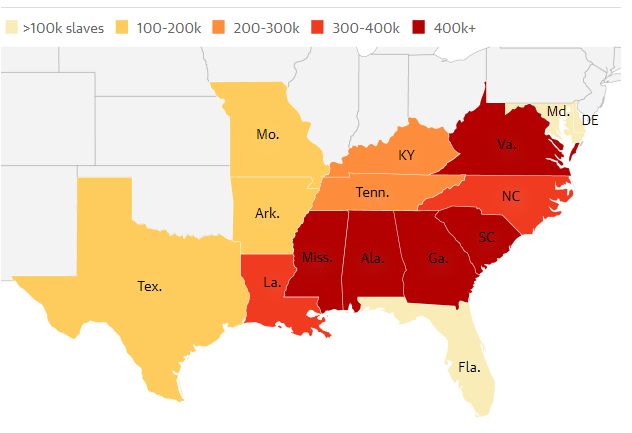
Eight of the first 12 U.S. presidents were slaveholders. Supporters of slavery supported the efforts of groups such as the American Colonization Society, which “sent back” tens of thousands of free black people - most of them born in America - to Liberia in the 19th century to prevent riots caused by the free descendants of slaves.
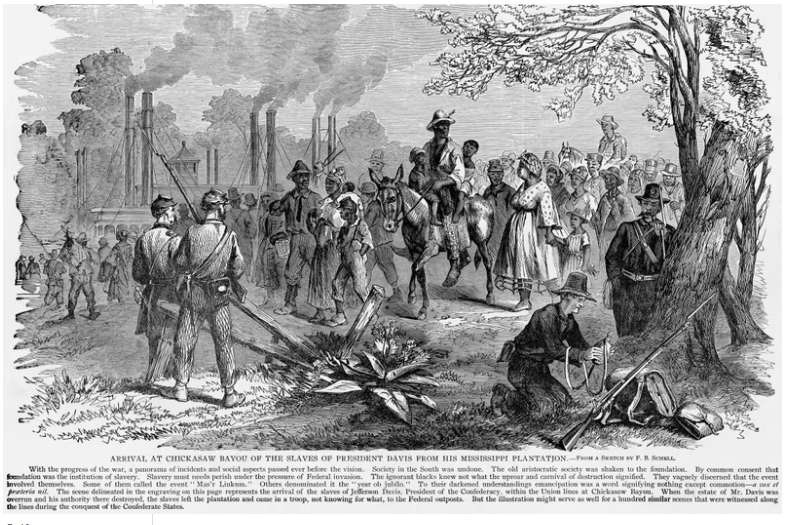
A painting depicting freed slaves once owned by Confederate President Jefferson Davis arriving at the “federal camp” at Chickasaw Bayou, Tennessee
1865
According to Abraham Lincoln, the Civil War was fought to preserve the integrity of America, not to abolish slavery - at least initially. American historians like to write that the Civil War was fought to free slavery, but slavery was not abolished after the war either. Lincoln entered the fight to free the slaves, some historians suggest, because he was worried that the British would support the south in its self-proclaimed self-determination and recognize the south as a separate entity. If he started a war to abolish slavery, it would have looked bad for the struggle of the south and the British supporting his cause. Lincoln's death was probably the first casualty of “a long civil rights movement that was not yet over,” suggested historian Peter Kolchin.
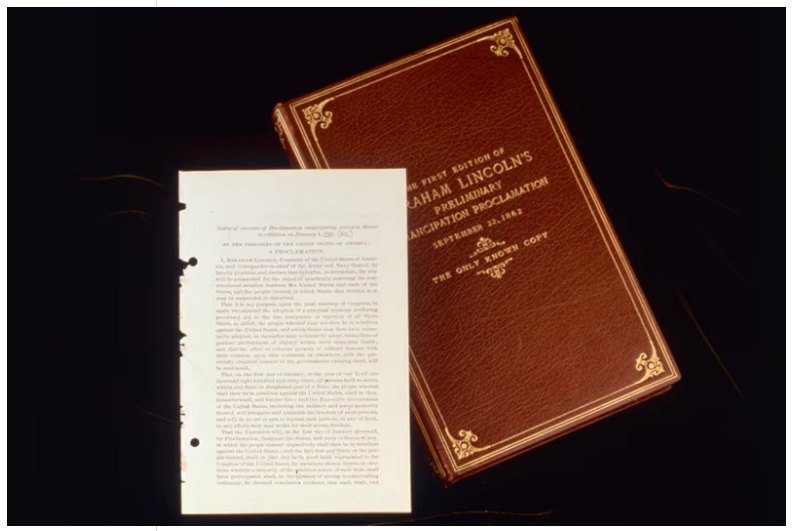
1868
Some experts argue that Reconstruction laid the groundwork for “the organization of new segregated institutions, ideologies of white supremacy, legal rationalizations, extra-legal violence, and everyday racial terror”-further widening the racial gap between blacks and whites. Others point out that the end of the war left black Americans free but their status “uncertain,” with the passage of “codes” that prevented black people from being truly free.
But eventually, under the 14th Amendment, African Americans were granted the right to vote. African Americans were also granted birthright citizenship: it extends to the descendants of freed black slaves and immigrants to this day.
1898
The recession of the late 19th century hit the United States. The Knight Riders marched in the dark, burning the homes of African Americans who had bought their own land. They came to Washington to demand change, as southern white Democrats had abolished many of the, albeit limited, freedoms of Reconstruction just a couple decades before.
The era of Jim Crow segregation prohibited African Americans from drinking from the same water fountains, eating in the same restaurants, or attending the same schools as white Americans, all of which lasted until the 1960s, and sometimes much longer.
1926
As African Americans were denied jobs and opportunities during the Jim Crow era, and as more jobs became available in the North and Midwest, more than 2 million southern African Americans migrated after World War I. Yet, even hundreds of miles away from southern segregation, these migrating Americans encountered “sunset cities,” where black people were not welcome after sundown, and restrictions on where they could live in cities.
For example, Oregon's constitution did not remove the clause prohibiting blacks from entering the state until 1926.
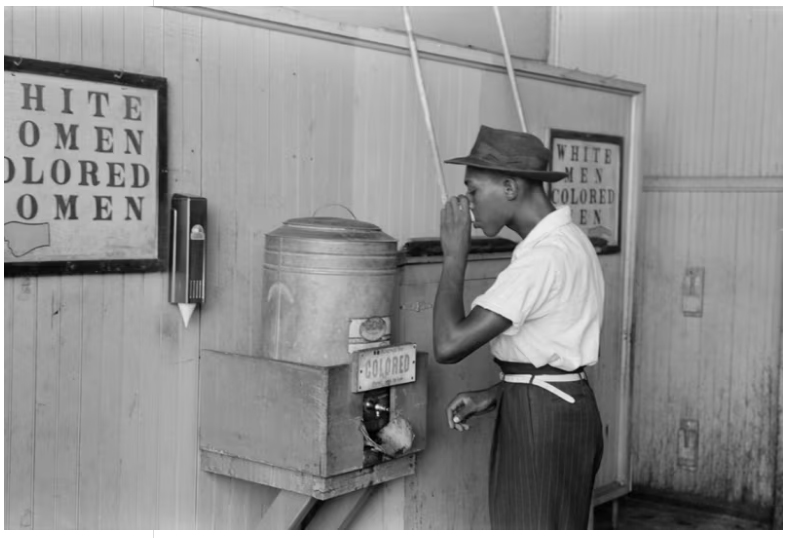
A man drinks water from a cooler for “coloreds” at a bus station in Oklahoma City in July 1939. Photo: Russell Lee
1954
As the end of the Jim Crow era and the civil rights struggle neared, the struggle continued. For example: it was not until 1948 that the U.S. Army desegregated by presidential decree. In 1954, in the Brown v. Board of Education decision, the Supreme Court ruled that segregation was unconstitutional and schools should be integrated. Civil rights leaders led marches against segregation across the country in the 1960s. In 1964, President Lyndon Johnson signed the Civil Rights Act into law. Getting African American children into white schools in white neighborhoods was considered constitutional.

African Americans vote for the first time since 1890 in the 1946 Democratic primary in Georgia.
1965
“Slavery was gone, but Jim Crow was alive. Almost all southern African Americans were excluded from the ballot box and the political power it could give,” Edward E. Baptiste wrote in Half Never Told: Slavery and the Making of American Capitalism. The Voting Rights Act of 1965 attempted to remedy this by prohibiting racial discrimination in voting and imposing restrictions on a number of Southern states if they tried to change voting rights laws. These restrictions were recently overturned by a 2013 Supreme Court ruling.
Since the publication of Ta-Nehisi Coates' book The Case for Reparations in 2014, the topic of settling financial debts for 250 years of slavery has risen up the political agenda. Proponents of a financial settlement for the descendants of slaves say it is meant to address the racial inequality that still persists in the United States.
A 2017 Pew study found that the median wealth of white households is $171,000 - 10 times that of black households ($17,100). Democratic presidential candidate Cory Booker introduced a Senate reparations bill and received support from Elizabeth Warren and Bernie Sanders...
2013
19.02.2013. The Parliament of the state of Mississippi ratified the law on the abolition of slavery. Formally, slavery on the territory of the USA was until 2013. Thanks to kind people, they gave me the last date.
https://aftershock.news/?q=node/1412954
#BLM #afroamericans #USA #US #american #slavery #racism #european #capitalism #african #negroes #british #colonialism #anniversary #history
3 Likes
2 Comments
1 Shares

Out of 654 Thai foreign workers questioned, all of them said they had been exposed to sexual assault.
A report, uncovered during the #Knesset's Special Committee on Foreign Workers on Tuesday, shows that all Thai foreign workers who work in Israeli agriculture have experienced some form of sexual assault at their jobs.
The report, compiled by immigration expert Dr. Yahel Kurlander and Dr. Shahar Shoham, detailed that out of 654 Thai foreign workers questioned, all of them said they have been exposed to sexual assault.
#Israel #SexualAssault #Agriculture #Politics #Racism #Inhumanity #Immorality #Impunity
One person like that
1 Shares
since i'm not allowed to comment on this, i'll have to share it. i wonder, how i am supposed to know about the colors of the skins of the people involved here.
#fediverse #hubzilla #mastodon #domination #superiority

We're all racists, probably even more so if we aren't on Mastodon
So I've just learned the other day that curating your timeline/stream according to your personal interests and/or the topic of your account/channel is utterly racist. No matter how specialised your account/channel is.
Everyone in the Fediverse is basically required to follow a substantial amount of Black users, especially Black activists. If you're on Hubzilla or (streams), you must actually follow them, i.e. you must give them full permissions to send you anything and everything unhindered and unlimited. You must not use account/channel-wide or per-contact filters on them. Even if each one of them boosts 100 posts per day, you must not filter or disallow their boosts.
Also, if you're on Friendica, Hubzilla or (streams), all of which count and list unread messages, you must not simply mark what has come in from them as read. You must read it all and be interested in it all. This includes all comments on these posts. And yes, you must re-read everything whenever it tries to catch your attention again, e.g. if someone has liked/faved or boosted/reposted/renoted/repeated it.
But even if you receive thousands of comments along with those hundreds of extra posts, you must not comment on these comments. Not unless either a comment mentions you explicitly, or you're mutually connected to whoever wrote the comment. As you wouldn't even receive that comment on Mastodon, replying to it counts as reply-guying and mansplaining on Mastodon, completely regardless of how you comment. It's highly disrespectful, and if Black people are involved, it's racist.
It doesn't matter if this has allegedly been perfectly normal, the standard and part of the culture since five and a half years before Mastodon was launched. Mastodon rules supreme over the whole Fediverse, and only Mastodon's culture has any validity anywhere in the Fediverse. Any culture that differs from Mastodon's is toxic and evil and must be abolished.
Speaking of which, let's suppose you come across one of these many threads in which Black Mastodon users talk with other Black Mastodon users and Mastodon-using allies about how the Fediverse needs to be made safer. In this case, no matter how blatantly obvious it is that all people involved in this thread have no idea of the Fediverse outside Mastodon, you are not allowed to chime in and tell them about places which are safer due to their technological design and how they work.
First of all, it'd be mansplaining and reply-guying. Second, there's a tendency for Black Mastodon users to trust the rest of the Fediverse even less than Mastodon, what with e.g. Nazi instances on Pleroma. And third, your suggestion is likely to be taken for an attempt at nudging them into moving to one specific place, essentially trying to hoard them in a ghetto and segregate them from the rest of the Fediverse. In short, there's letting them wait for the Mastodon instances they're on to improve, and there's racism.
While we're at it: Even if you're on Friendica, Hubzilla or (streams), and you hate Mastodon with a burning passion for very good reasons, you must support Black-led Mastodon instances. Otherwise you're a racist.
Lastly, while I don't have proof for it, I'm pretty sure that everything that counts as racism towards Black users may also count as
- racist towards everyone else who isn't white
- sexist towards everyone who isn't cis-male
- homophobic towards everyone who isn't heterosexual
- transphobic towards trans people
- generally queerphobic towards everyone who isn't cisgender
- ableist towards disabled people, no matter what else you do to include them
- Islamophobic towards Muslims
- anti-Semitic/anti-Judaist towards Jews
- and generally hostile and xenophobic towards all marginalised minorities anywhere in the Fediverse.
#Long #LongPost #CWLong #CWLongPost #FediMeta #FediverseMeta #CWFediMeta #CWFediverseMeta #Fediverse #Mastodon #Friendica #Hubzilla #Streams #(streams) #FediverseSafety #Mansplaining #ReplyGuy #ReplyGuys #Racist #Racism #Sexist #Sexism #Homophobic #Homophobia #Transphobic #Transphobia #Queerphobic #Queerphobia #Ableist #Ableism #Islamophobic #Islamophobia #AntiSemitic #AntiSemitism #Xenophobic #Xenophobia
3 Comments
Colorblindness in the Public and Private Sphere
Coleman Hughes’s book, The End of Race Politics: Arguments for a Colorblind America, has provoked a lot of discussion here and elsewhere. Though I have all the respect in the world for Coleman and his ideas, and I think his prominence is a net good for our racial discourse, I have some misgivings about his argument. Some of these misgivings, I have no trouble admitting, derive from my own particular history, upbringing, and social and intellectual development.
https://glennloury.substack.com/p/colorblindness-in-the-public-and
Morgan McSweeney's plan for the far-Right - UnHerd
The only way to defeat the BNP’s racism, therefore, was to change the leadership. It wasn’t just a question of what was being said but who was saying it, McSweeney concluded.
Influential in McSweeney’s strategy about how to tackle the BNP was the book by American behavioural economist Cass Sunstein, On Rumours: How falsehoods spread, Why we believe them, What can be done. “Terrible events produce outrage,” Sunstein writes, “and when people are outraged, they are all the more likely to accept rumours that justify their emotional states.”
Probably apply to the whole world just as well...
https://unherd.com/2024/08/morgan-mcsweeneys-plan-for-the-far-right/
One person like that
3 Comments
6 Likes
3 Shares

Cry biggots, cry...
Despite massive sexist and racist attacks against her, she won the gold medal at Olympics.
Congratulations to her for not giving up and showing the world how strong women fight back against bigotry and hate.
PS. I don't see any of those vocal "woman-life-freedom" folk posting anything in support of her.
#Algeria #Olympics #Racism #Sexism #WomenRights #Africa #Paris2024
3 Likes
2 Comments
(4) Did The Democrats Push Through Kamala Harris? I Glenn Loury and John McWhorter
Interesting discussion about "the choice to be black".
2 Comments
1 Shares
One person like that
One person like that
1 Comments
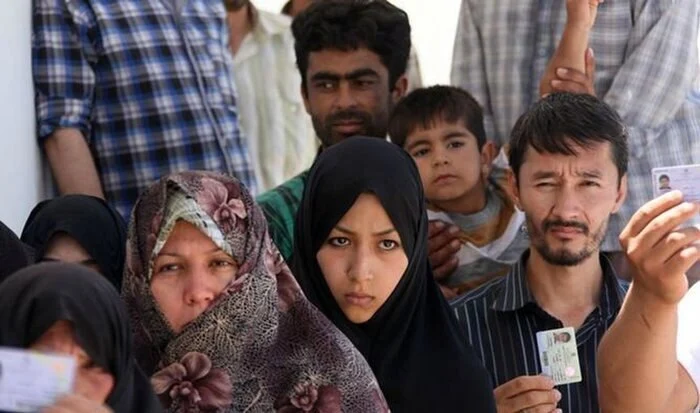
Deputy Justice of East #Azarbaijan province of #Iran: Residence of #Afghan nationals is prohibited in a number of provinces, including East Azarbaijan, even with residence permits.
The level of #racism and #discrimination against afghans is reaching new level. Many of them have lived all their lives in Iran and never been to Afghanistan, bit they can never receive Iranian citizenship, much less having the right to live wherever they want. Many afghan children can't even get a birth certificate, specially if one of the parents is Iranian.
Iranians who proud themselves of being friendly and welcoming, have an extreme hate against people from neighboring countries, specially those from #Afghanistan.
One person like that
3 Likes
1 Shares
Good to know that Bellingcat is assisting.
♲ Texas Observer - 2024-08-04 15:36:53 GMT
Last week: Members or supporters of the Aryan Brotherhood of Texas, identified by the Texas Observer's @stevanzetti and @Bellingcat, appear to have perpetrated a possible hate crime at the location of a river tubing company. https://www.texasobserver.org/neo-nazi-martindale-arrest-gang/#extremism #WhiteSupremacy #Texas #news #CriminalJustice #police #racism
2 Shares
